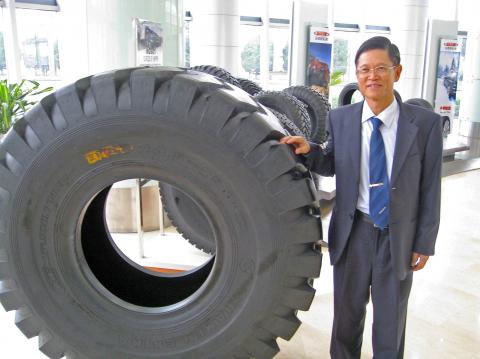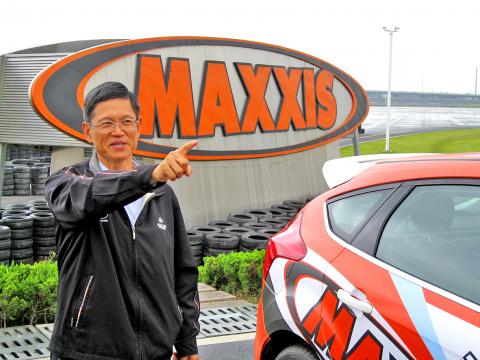Cheng Shin Rubber Industry Co (正新橡膠), the world’s ninth-largest tire maker, said it expects that spending more on research and development (R&D) at its operation in Kunshan, Jiangsu Province, China, this year will help it secure more orders from international brands.
The Changhua County-based company — known for its brands CST, Maxxis, Sakura and Presa — also aims to dethrone Japan’s Yokohama Rubber Co to become the eighth-largest tire maker in the world by tapping the fast growth the Chinese car market has exhibited over recent years, it said.
Although the US currently has the largest amount of cars in the world, China is likely to supersede the US as the world’s largest car market in the future, Cheng Shin chairman Robert Lo (羅才仁) said on Tuesday in Kunshan.

Photo: CNA
Last year, Cheng Shin supplied 13 million tires for about 3 million new cars in China, accounting for 13 percent of the country’s total new car sales of 23 million. That is higher than the 10 percent registered in 2012, Lo said.
From January through last month, Cheng Shin reported revenue of NT$87.18 billion (US$2.9 billion), registering a 4.83 percent decline from NT$89.35 billion a year ago due to fierce competition from global tier-one tire makers in China.
Analysts say the sales drop also emphatically reflects the slowing growth in China’s commercial vehicle market.

Photo: CNA
“It is as if all major tire makers around the world are playing the [soccer] World Cup in China,” said Lo, who in June took the helm of the company from his father, Luo Jye (羅結), who founded Cheng Shin.
The younger Lo said his role is to try to support the different teams within the company and help them cooperate with each other.
“It is impossible for a chairman to control every part of the company; we have to also rely on our professional management personnel,” Robert Lo said.
He said he is confident that Cheng Shin can obtain more orders from global car vendors, given that the company has Asia’s largest proven tire testing ground in Kunshan.
The NT$5 billion testing facility — the building of which began in 2003 and was completed in November 2012 — spans 86 hectares, nearly 60 percent of the total area of Cheng Shin’s Kunshan operation.
To build the field, the company spent one year investigating road conditions around the world and another two years designing the ground, Robert Lo said.
The tire-testing facility employs 300 R&D personnel, while the Kunshan operation has a total of 6,000 employees, he said.
“The testing facility allows us to submit every car to the most extreme conditions and see if the design of our tires goes well with the vehicle,” he said.
According to Lo, although the world’s top 10 tire makers all have testing facilities like the Kunshan ground, Cheng Shin is the only one with such a facility in Asia.
“Car makers tend to have more confidence in a tire company with a field like that,” Robert Lo said.
He said the test facility can cut the development time for a tire by about 30 percent because the company does not need to ship the tires to Europe or other places for testing.
The Kunshan test facility’s largest client is BMW AG, Robert Lo said, adding that Ford Motor Co is also a major client.
Cheng Shin supplies the tires used for the best-selling Ford Focus sedans in China, with 400,000 of the cars distributed in the country each year by Ford’s local subsidiary.
This year, the Kunshan operation will spend about 3 percent of its revenue on R&D, Robert Lo said.
In total, Cheng Shin spent NT$1.57 billion on R&D in the first half of the year, accounting for 2.45 percent of its NT$64.29 billion revenue, according to the company’s filing with the Taiwan Stock Exchange.
The Kunshan operation accounted for 18 percent of Cheng Shin’s total revenue of NT$133.09 billion last year, assistant vice president Richard Lo (羅永勵) told reporters yesterday.
In the first half of the year, about 64.3 percent of the division’s revenue came from sales in the original equipment market, the highest rate among all the company’s factories, according to Cheng Shin.
About 26.9 percent of the company’s revenue from January through June came from the original equipment market, it said.

Taiwan Semiconductor Manufacturing Co (TSMC, 台積電) founder Morris Chang (張忠謀) yesterday said that Intel Corp would find itself in the same predicament as it did four years ago if its board does not come up with a core business strategy. Chang made the remarks in response to reporters’ questions about the ailing US chipmaker, once an archrival of TSMC, during a news conference in Taipei for the launch of the second volume of his autobiography. Intel unexpectedly announced the immediate retirement of former chief executive officer Pat Gelsinger last week, ending his nearly four-year tenure and ending his attempts to revive the

WORLD DOMINATION: TSMC’s lead over second-placed Samsung has grown as the latter faces increased Chinese competition and the end of clients’ product life cycles Taiwan Semiconductor Manufacturing Co (TSMC, 台積電) retained the No. 1 title in the global pure-play wafer foundry business in the third quarter of this year, seeing its market share growing to 64.9 percent to leave South Korea’s Samsung Electronics Co, the No. 2 supplier, further behind, Taipei-based TrendForce Corp (集邦科技) said in a report. TSMC posted US$23.53 billion in sales in the July-September period, up 13.0 percent from a quarter earlier, which boosted its market share to 64.9 percent, up from 62.3 percent in the second quarter, the report issued on Monday last week showed. TSMC benefited from the debut of flagship

A former ASML Holding NV employee is facing a lawsuit in the Netherlands over suspected theft of trade secrets, Dutch public broadcaster NOS said, in the latest breach of the maker of advanced chip-manufacturing equipment. The 43-year-old Russian engineer, who is suspected of stealing documents such as microchip manuals from ASML, is expected to appear at a court in Rotterdam today, NOS reported on Friday. He is accused of multiple violations of the sanctions legislation and has been given a 20-year entry ban by the Dutch government, the report said. The Dutch company makes machines needed to produce high-end chips that power

Taiwan would remain in the same international network for carrying out cross-border payments and would not be marginalized on the world stage, despite jostling among international powers, central bank Governor Yang Chin-long (楊金龍) said yesterday. Yang made the remarks during a speech at an annual event organized by Financial Information Service Co (財金資訊), which oversees Taiwan’s banking, payment and settlement systems. “The US dollar will remain the world’s major cross-border payment tool, given its high liquidity, legality and safe-haven status,” Yang said. Russia is pushing for a new cross-border payment system and highlighted the issue during a BRICS summit in October. The existing system